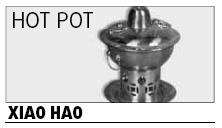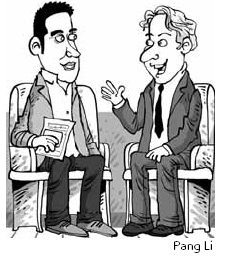
One day last week I went to a private clinic in Beijing. As usual the clinic was quiet and only a few clients - half of them expats - sat around waiting. A tall Scandinavian-looking guy came and sat next to me. We struck up a conversation about the newspaper story I was reading. Then he asked.
"Are you Chinese-Chinese?"
Reflexively I explained that I had lived in the US for many years. The Scandinavian guy then nodded, seemingly satisfied. "You don't look very Chinese to me," he said.
It was not the first time that I was asked that question, which made me wonder - what makes me look not very Chinese-Chinese? Surely there are other Chinese who gel their hair, wear Zara and work out in the gym.
My Chinese staff at work say it is not my appearance, but some jenesaisquoi (difficult to describe attribute) that gives me away. I laugh and speak my mind at will at work. I tell them not to call me "boss" but address me by my first name. In return, they make fun of my poor memory of Chinese idioms.
Then what is this "Chinese-Chinese"-ness that I am so obviously poor at grasping?
The question did not always bug me. In fact, it fanned my ego that my high-school friends called me "half-American," for raising my hands and asking questions in class, and for not shying away from any opportunity to be different. I used to be flattered when asked by other Americans if I had grown up in the US, back in the days when I desired very much to be something other than the stale, conservative and order-following Chinese stereotype in my mind.

Then after spending 12 years in the US, I knew I would never be a full-blown American. So I moved back, partly to understand whether there is such a thing as Chinese-Chinese?
The longer I have lived in Beijing, however, the less certain I am of what a true Chinese-Chinese is. For every three money-chasing Chinese, I can find a Chinese content with his routine life. For every five Chinese who give up their dreams for desk jobs, I can find an entrepreneur risking it all to strike it rich. And for every 10 Chinese who go ga-ga over Gucci and Prada, I can find a young kid dead serious about art or the environment.
Of course, statistically, most Han Chinese in prosperous regions of China are very focused on making their lives better off, their kids better educated, and their families and friends proud of their achievements. But any statistical definition of Chinese-Chinese sounds a bit too vulgar. Aren't there any big words that can be claimed to be shared by all true Chinese, like Confucianism, materialism, individualism, conformism, or entrepreneurialism?
I remember my trip along the ancient Silk Road, from Xi'an to Kashgar, a few years ago. I saw the ruins of Tang Dynasty (AD 618-907) grandeur and Han Dynasty (206BC to AD220) border expansion. I met many ethnic groups with languages and customs different from us Han. I found, at the many Buddhist grottoes along the Silk Road, how Buddhism had migrated to and been modified by China. I realized then that what we considered to be "Chineseness" now must have been different from that of our forefathers.
So any romantic concept of deep-rooted Chinese Chinese-ness appears to be a myth. Of course there exists a continuation from generation to generation, but this continuation itself has always been changing.
I believe true Chinese-Chinese-ness is our ability to absorb, to learn and to grow, which would make me feel more Chinese-Chinese despite what others might say.
